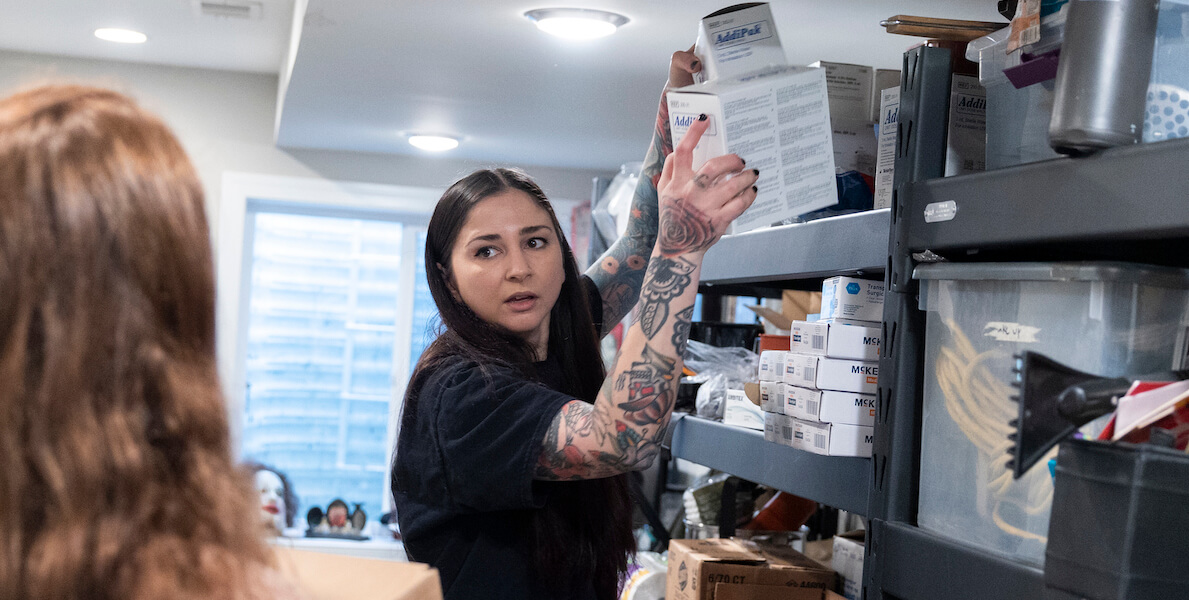Twenty years ago, Nicole Bixler could never have imagined her life as it is now. At 43, Bixler owns a home in Port Richmond with her husband, Wes. She is a licensed clinical social worker as well as drug and alcohol counselor. And she is the co-founder of Operation In My Backyard, a harm reduction group that has helped thousands of people struggling with substance use disorder over the last six years in Kensington.
Just over 20 years ago, Bixler herself was in the exact same position as many of the people she now serves.
Bixler was 15 when she first discovered heroin. The New Jersey native had been experimenting with drugs recreationally for several years beforehand, but when she tried heroin, something changed. The euphoria she felt from the drug was “exactly what my life had been missing,” she says.
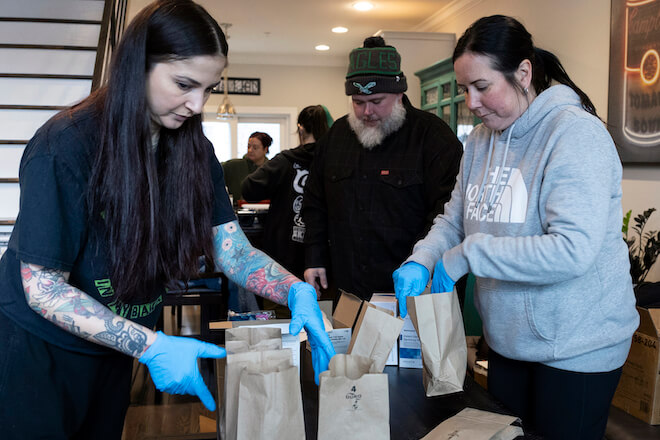
Things for Bixler subsequently got “really bad, really quick.” Between the ages of 15 and 22, she found herself homeless and living out of a subway station. She experienced “countless overdoses” and visited treatment centers several times but struggled to stop using. At 20, she was sentenced to a two-year prison sentence for burglary. She spent her 21st birthday in her cell.
When Bixler was released from prison, she moved back in with her mother and entered a medically assisted rehab in 2002. For the first time in her life, recovery stuck. She celebrated her 20th year in recovery last year.
The woman behind Operation In My Backyard knows that not everyone is ready to commit to the cause as much as she has, and implores anyone who cares to do little things.
Bixler moved to Philadelphia in 2017. It was her first time feeling comfortable spending extended time in the city since she’d sought drugs in Kensington in her teens. Though it was hard to confront the memories she had of that time in her life, she decided to attend the Overdose Remembrance Walk, now in its seventh year, that August. Seeing how many people in the city had been affected by the opioid crisis moved her. She felt goosebumps across her body. “Now I have to do something,” she remembers thinking.
Five years on, Bixler has formed a non-profit, recruited dozens of volunteers and has provided food, supplies and resources to approximately 15,000 people in Kensington, many of them living on the street and living with opioid addiction. This year alone, they’ve given out more than 5,000 safe-use kits.
“A band of misfits”
Bixler’s outreach began with peanut butter and jelly sandwiches. Four nights a week, using “whatever we could scrounge together,” she drove around Kensington, passing out PB&Js to anyone who wanted one. Later, to increase her reach, she started a fundraiser on Facebook, raising about $3,000 with the help of friends and family. From there, “it grew pretty quickly,” Bixler says.
Bixler was introduced to a donor who helped her get 501(c)(3) status for the non-profit she would name Operation In My Backyard — so called to establish Bixler’s intention to fight back against the “not in my backyard” argument that so many use to dismiss people who use drugs. In addition to monetary grants, she also began to receive donations from local businesses and restaurants. Dietz and Watson donates hundreds of hot dogs.
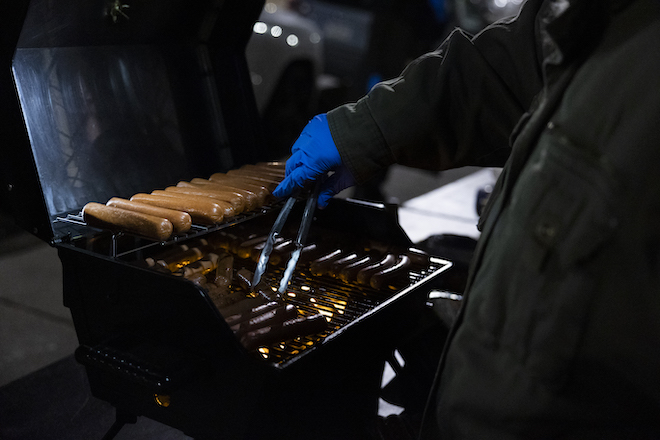
Each Tuesday and Thursday evening, Operation In My Backyard sets up a half-block of tables near the intersection of Somerset and Ruth streets. Volunteers help Bixler unload the back of her truck, filled to the brim with food, clothing, safe use supplies and other donated goods. Helpers serve hot meals, direct participants to clothing in their size, distribute safe use supplies, and share information. Local medical students help to provide wound care. People who regularly attend the outreach are also offered small jobs, such as sweeping the street of trash, and offered compensation in return.
“We’re a band of misfits,” Bixler says lovingly of her crew.
Safe use
Kara Siegrist is one of Operation In My Backyard’s regular volunteers. Siegrist’s husband suffered and died just last year from substance use disorder. She credits the non-profit with saving her husband’s life on numerous occasions by reversing overdoses. When she met Bixler for the first time, Siegrist remembers thinking, “I felt in my core that she’s there for the right reasons.” Though volunteering can be challenging and sad, it’s also been therapeutic for Siegrist. “It helps me deal with my grief and gives me a purpose,” she says. “I don’t want to see anyone else lose someone the way I have.”
Interacting with people struggling with substance use disorder each week demands Bixler lead with compassion and love. The people she serves do not often get such acceptance elsewhere. “We have to look past the behavior and see the person,” she explains. “Everybody has to have a space where they can feel loved.” When she used drugs herself, she was constantly told, “Don’t do drugs and, if you do, you’re a scumbag,” she remembers. “I couldn’t really talk to anyone.”
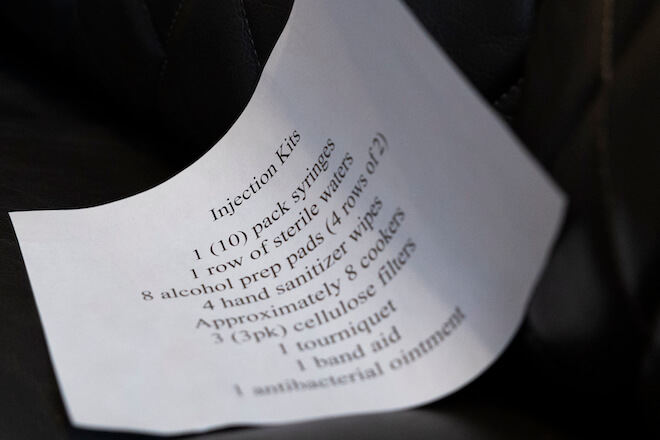
Now, she treats others the way she wishes she’d been treated. This includes not insisting that participants stop using drugs before they’re ready to do so. “That’s condescending and judgmental,” she says. “Everybody is their own expert in their life, and who am I to tell them what’s better or worse for them?”
To that end, she encourages participants to use as safely as possible. The operation’s outreach tables stay well stocked with free and sterile supplies such as syringes, which, when shared, often spread communicable diseases. She also provides testing kits so that people can understand how toxic their drug supply is. And she offers Narcan to reverse overdoses. “We want to provide compassionate support and share space with them in a nonjudgmental way,” Bixler says. “When someone dies, it’s a sadness [I feel], and then it’s anger, because it could have been prevented.”
Operation In My Backyard sees about 150 to 200 people every day they’re open. Bixler knows most participants on a first-name basis. Siegrist has taken one participant she’s grown close with to detox; she’s visited another in jail. “They expect us. They rely on us. They trust us,” Bixler explains.
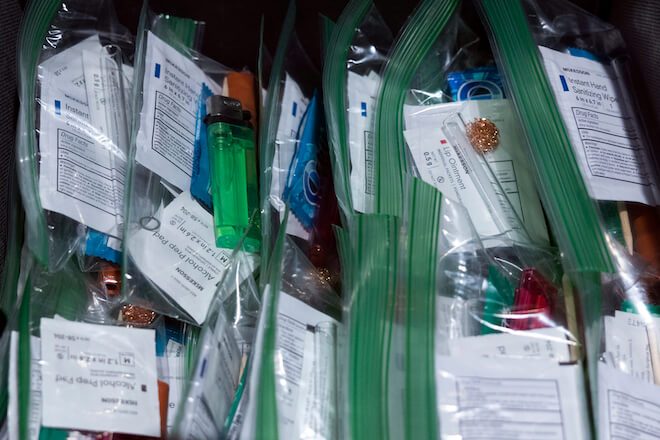
Serving the whole community
The non-profit does not only serve people who use drugs. Local families often come through the outreach line for hot meals. The group helped members of a local housing complex secure government IDs and recently gave a neighborhood child a donated bike.
Bixler is passionate about expanding her operation to accommodate the growing need. This year, she secured grants to add a mobile unit to serve participants more frequently and in other areas of the city. She dreams to one day have a building where participants can receive wraparound services such as mental health care and housing support. “I feel grateful that we can provide… [but] what else can we do?” she asks.
Interacting with people struggling with substance use disorder each week demands Bixler lead with compassion and love. The people she serves do not often get such acceptance elsewhere.
The woman behind Operation In My Backyard knows that not everyone is ready to commit to the cause as much as she has, and implores anyone who cares to do little things. “There is still an impact that you can make,” she says. She suggests keeping water bottles and granola bars in your car to pass out to people in need as you pass them on the street.
Even if you have nothing to give, looking people in the eye goes a long way, she says, since people experiencing substance use disorder are so often looked over. And, for those who are ready to get more involved, Operation In My Backyard is currently accepting cold-weather items, supplies from an Amazon wishlist, monetary donations and volunteers. Their next fundraiser will be held on November 17 in honor of Kara Siegrist late husband.
“I truly look up to Nicole,” Siegrist says about her friend and colleague. “She is 100 percent a leader. She puts the community and other people in need before her[self] all the time.” She notes that Bixler only has one day off a week. “She’s one of the hardest working, most dedicated people that I know.”
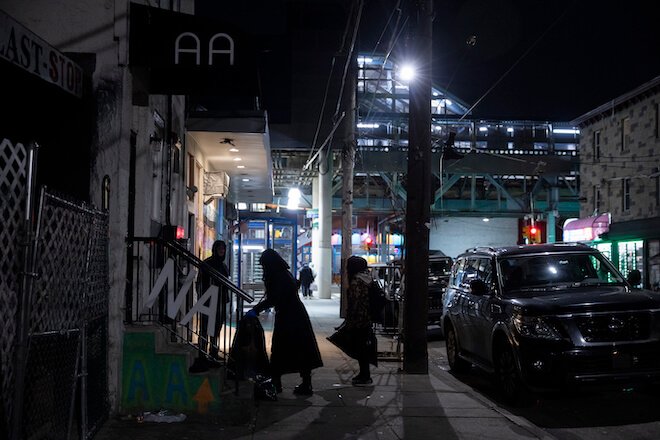
Correction: A previous version of this post misspelled Kara Siegrist’s last name.
![]() MORE ON TACKLING THE OPIOID CRISIS
MORE ON TACKLING THE OPIOID CRISIS



